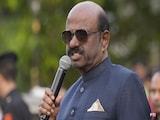The top court has questioned who can recommend the revocation of Article 370.
Was the Centre's move to scrap Article 370 of the Constitution that gave Jammu and Kashmir its special status and split the state into two Union Territories, constitutionally valid? The Supreme Court is expected to take a call on the issue today.
Here are 10 points on this big story:
- The verdict from a five-judge Constitution bench led by Chief Justice of India DY Chandrachud comes in response to a slew of petitions challenging the Centre's move four years ago.
- The petitioners have argued that Article 370 cannot be scrapped unilaterally by the Centre, since the powers of the Constituent Assembly was vested in the J&K legislature after it was dissolved in 1957.
- The top court has questioned who can recommend the revocation of Article 370. Under the rules, a nod is required from the Constituent Assembly to scrap Article 370, which the Constitution held temporary. The court has also asked how the Article became permanent after the Constituent Assembly was dissolved.
- The Centre has argued that its decisions were taken within the legal framework. It has also contended that the mainstreaming of Jammu and Kashmir has reduced terrorism and provided a level playing field.
- Over the last four years, it has helped move the erstwhile state on the fast-track to development, the government has argued.
- Article 370, it also maintained, deprived the people of J&K of many fundamental rights, including the right to education. The Constitutional rights that automatically apply to every Indian could not apply to residents of Jammu and Kashmir unless okayed by the state legislature.
- Conversely, Article 35A, which was also scrapped along with Article 370, did not allow people from other parts of the country the right to get jobs, own land and settle in Jammu and Kashmir -- which is part of their fundamental rights. These were reserved as special privileges reserved only for the residents of Jammu and Kashmir.
- Security has been strengthened in Kashmir Valley ahead of the verdict. The BJP has said the decision of the top court should be respected.
- Former Chief Minister and National Conference chief Omar Abdullah said his party will not disturb the peace even in case of an adverse verdict. They will continue their fight in a lawful manner, he said. Mehbooba Mufti's People' Democratic Party and the Congress have expressed hope that the court will be on the side of the people.
- Article 370 was scrapped and Jammu and Kashmir split in August 2019 - over a year after the PDP-BJP alliance government had collapsed . It took place while the erstwhile state was under President's Rule.
Advertisement
Advertisement
Advertisement
Featured Video Of The Day
Iran Protest News | Iran Protests Escalate Nationwide Amid Economic Crisis and Rising Death Toll















